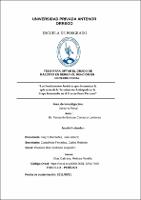| dc.contributor.advisor | Diaz Cabrera, Melissa Fiorella | |
| dc.contributor.author | Carrasco Landeras, Fernando Enrique | |
| dc.creator | Carrasco Landeras, Fernando Enrique | |
| dc.date.accessioned | 2021-07-14T05:19:27Z | |
| dc.date.available | 2021-07-14T05:19:27Z | |
| dc.date.issued | 2021 | |
| dc.identifier.uri | https://hdl.handle.net/20.500.12759/7778 | |
| dc.description.abstract | El presente trabajo de investigación, se encuadra en la problemática de la
aplicación del proceso especial de Terminación Anticipada en etapa Intermedia
del proceso penal peruano; siendo que a partir de la identificación de la misma,
y de diversidad de soluciones que nos brinda tanto la jurisprudencia como la
dogmática, es que nos planteamos el siguiente problema: ¿Cuáles son los
fundamentos jurídicos que determinan la aplicación de la Terminación
Anticipada en la etapa intermedia en el proceso penal peruano?.
Respondiéndonos preliminarmente con la hipótesis de afianzar una posible
aplicación, sustentada en la optimización de los Principios de Economía,
Celeridad y Elasticidad Procesal, que vendrían a ser las razones que
justificarían la incorporación del Proceso Especial de Terminación Anticipada,
en la etapa intermedia del Proceso Penal Común, en la medida que incide en la
reducción y simplificación de la carga procesal”.
Con la finalidad de contrastar nuestra hipótesis, asumimos determinados
indicadores doctrinarios, normativos y jurisprudenciales; de esta manera
nuestros fundamentos se realizaron en base a la Teoría General del Proceso
Penal, en específico las bases procesales del Proceso Especial de Terminación
Anticipada; y asimismo se procedió a discutir los resultados obtenidos sobre las
posiciones jurisprudenciales y casuísticas y doctrinarias, de la Terminación
Anticipada o sus símiles en otros ordenamientos jurídicos, como Estados
Unidos, Italia, Colombia y Perú.
Es así, que hemos procedido a confirmar nuestra hipótesis planteada,
llegando a la conclusión de que el proceso especial de Terminación Anticipada
en realidad es uno de los instrumentos más interesantes para canalizar las
expectativas en una Administración de Justicia más rápida, y por lo tanto los
fundamentos que sustentan su aplicación en Etapa Intermedia implican la
optimización de Principios como el de Economía, Celeridad y Elasticidad
Procesal, y ello e la medida que por su propia naturaleza, incide en la reducción
y simplificación de la carga procesal. Debiendo recomendar la complementación
de estas conclusiones a través de investigaciones sobre la eficacia práctica de
la Terminación Anticipada en el Proceso Penal Peruano. | es_PE |
| dc.description.abstract | The present investigation work is framed in the problematic of the application
of the special process of Early Termination in the Intermediate stage of the Peruvian
criminal process; being that from the identification of the same, and from diversity
of solutions that both jurisprudence and dogmatic offers us, is that we consider the
following problem: What are the reasons that justify the incorporation of the Special
Early Termination Process in the Intermediate Stage of the Common Criminal
Procedure?. Responding preliminary to the hypothesis of strengthening a possible
application, based on the optimization of the Principles of Economy, Celerity and
Procedural Elasticity, which would be the reasons that would justify the incorporation
of the Special Early Termination Process, in the intermediate stage of the Criminal
Procedure Common, insofar as it affects the reduction and simplification of the
procedural burden.”
In order to test our hypothesis, we assume certain doctrinal, normative and
jurisprudential indicators; in this way our foundations were made based on the
General Theory of the Criminal Procedure, specifically the procedural bases of the
Special Early Termination Process; and also proceeded to discuss the results
obtained on the jurisprudential and casuistic and doctrinal positions of the Early
Termination or its similes in other legal systems, such as the United States, Italy,
Colombia and Peru.
Thus, we have proceeded to confirm our hypothesis, reaching the conclusion
that the Special Early Termination Process is actually one of the most interesting
instruments to channel expectations in a faster Administration of Justice, and
therefore the fundamentals that support its application in the Intermediate Stage
imply the optimization of Principles such as Economy, Celerity and Procedural
Elasticity, and this and the measure that by its very nature, affects the reduction and
simplification of the procedural burden. It should recommend the complementation
of these conclusions through research on the practical effectiveness of Early
Termination in the Peruvian Criminal Procedure. | en_US |
| dc.description.uri | Tesis | es_PE |
| dc.format | application/pdf | es_PE |
| dc.language.iso | spa | es_PE |
| dc.publisher | Universidad Privada Antenor Orrego | es_PE |
| dc.relation.ispartofseries | M_DERE_139 | |
| dc.rights | info:eu-repo/semantics/openAccess | es_PE |
| dc.rights.uri | https://creativecommons.org/licenses/by/4.0/ | es_PE |
| dc.source | Universidad Privada Antenor Orrego | es_PE |
| dc.source | Repositorio Institucional - UPAO | es_PE |
| dc.subject | Terminación anticipada | es_PE |
| dc.subject | Proceso penal peruano | es_PE |
| dc.title | Los fundamentos jurídicos que determinan la aplicación de la terminación anticipada en la etapa intermedia en el proceso penal peruano | es_PE |
| dc.type | info:eu-repo/semantics/masterThesis | es_PE |
| thesis.degree.level | Maestría | es_PE |
| thesis.degree.grantor | Universidad Privada Antenor Orrego. Escuela de Postgrado | es_PE |
| thesis.degree.name | Maestro en Derecho con Mención en Derecho Penal | es_PE |
| thesis.degree.discipline | Maestría en Derecho | es_PE |
| dc.subject.ocde | https://purl.org/pe-repo/ocde/ford#5.05.02 | es_PE |
| renati.advisor.orcid | https://orcid.org/0000-0001-7254-7409 | es_PE |
| renati.author.dni | 18212781 | |
| renati.advisor.dni | 42845936 | |
| renati.type | https://purl.org/pe-repo/renati/type#tesis | es_PE |
| renati.level | https://purl.org/pe-repo/renati/level#maestro | es_PE |
| renati.discipline | 421357 | es_PE |
| renati.juror | Neyra Barrantes, Julio Alberto | |
| renati.juror | Castañeda Ferradas, Carlos Roberto | |
| renati.juror | Palacios Bran, Roberto Alejandro | |
| dc.publisher.country | PE | es_PE |


